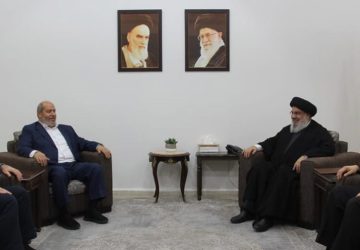Listen to the article
At the end of its session on Tuesday, the Cabinet reiterated its position on the return of the Syrian refugees to their country in dignity while safeguarding their wellbeing, in compliance with international resolutions, in particular the U.N. Security Council Resolution 2254.
This resolution, which calls for a ceasefire and a political solution to the conflict in Syria, was adopted in December 2015.
This involves, according to the Cabinet, “coordinating directly with the Syrian side through a ministerial delegation to be led by caretaker Minister of Foreign Affairs Abdallah Bou Habib.” The delegation will also include the caretaker Minister of Displaced Issam Charafeddine, caretaker Minister of Social Affairs Hector Hajjar, caretaker Minister of Labor Mustapha Bayram, caretaker Minister of Culture Mohammad Mortada, caretaker Minister of Tourism Walid Nassar, caretaker Minister of Agriculture Abbas Hajj Hassan, and caretaker Minister of Information Ziad Makari, as well as the Secretary General of the Supreme Defense Council General Mahmoud Asmar, and the acting head of the General Security General Elie Baissari. The delegation will also coordinate with the Arab League.
The Cabinet also instructed Bou Habib to convey Lebanon’s decision to participants at the Brussels 7 conference on the subject of displaced Syrians, to be held on Thursday. Bou Habib and Hajjar, have already left for Brussels on Tuesday.
The Cabinet also approved a private agreement with two French lawyers, Emmanuel Daoud and Pascal Beauvais, to assist the head of state litigation at the Ministry of Justice Helene Iskandar, in representing Lebanon in the case brought in France against the Governor of the Central Bank, Riad Salameh, in an alleged money-laundering case.
The choice of the two lawyers had been contested by the Cabinet and had led to a quarrel between caretaker Prime Minister Najib Mikati and the caretaker Minister of Justice Henry Khoury. It was the choice of Emmanuel Daoud in particular that had been challenged by the government, due to “possible links with an NGO promoting Zionist ideas.” Khoury was asked to propose other names, which he refused to do.
In a speech at the opening of the meeting, Mikati, affirmed that the government was making the necessary efforts to enable the public sector to function. In this context, he called on civil servants to be “positive,” promising that the remaining four of the seven salaries promised to them would be paid before June 15. Mikati also declared that he would convene the Cabinet early next week, with appointments and promotions within the security and military apparatuses on the agenda.





